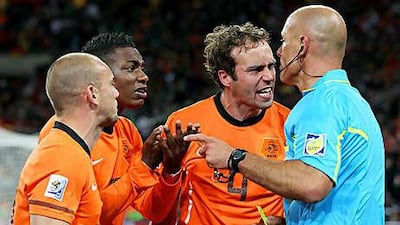JOHANNESBURG // Celebrations and recriminations. The day after the night before began with debate and disagreement over the numerous controversies that marred Africa's maiden World Cup final. Led by the domestic media of the victorious and vanquished finalists, and their overjoyed or disappointed fans, the Dutch-Spanish inquisition ensured Sunday's final will be remembered more as a blame game than a beautiful one. "As a game, it was disappointing, even tedious," said William Sharpe, a Holland-supporting South African in Cape Town. "Holland tried to be vigilant tactically, but it didn't work."
Spain, the swashbuckling champions, and Holland, criticised in some quarters for an overtly physical approach, returned home to royal welcomes yesterday. After landing back in Madrid, the Spanish history-makers - Vicente Del Bosque's squad is the first European nation to win a World Cup outside its home continent - received the favour of King Juan Carlos and the plaudits of grateful Madridistas as they toured the capital's streets on an open-top bus.
Bleary-eyed, Holland's players - beaten in a World Cup final for the third time - saw their planned victory ride, on a boat through Amsterdam's canals, sunk. Both teams, however, are heroes to their citizens. The scorn, directed from the countries' press pens anyway, was reserved for an Englishman. Referee Howard Webb's performance dominated editorials and radio talk shows in Holland and Spain. Webb handed out 14 yellow cards and one red, waved away Dutch and Spanish appeals for penalties and failed to give Holland a corner when Wesley Sneijder's late free-kick deflected behind off Cesc Fabregas.
That error was compounded when Spain countered up the pitch and Andres Iniesta scored the World Cup's deciding goal four minutes from the end of extra time. The Dutch press, while generally conceding that Spain were the better side, were heavily critical of Webb. Several publications put the blame for the Oranje's defeat squarely at the official's feet. AD Sportwereld described Webb as a "chump", whose "blunder" had cost Holland the cup, while De Telegraaf newspaper said the game had been a "nasty, niggly, fractious affair that had nothing to do with football, but was not helped by Webb".
Although he refused to directly criticise Webb, Bert van Marwijk, the Dutch coach, did not praise the official's contribution. "Both sides committed fouls, but I don't think the referee controlled the match well," he said. There was little Webb could do to avoid reaching for his cards as several of Del Bosque's players were caught high and late by Dutch challenges, but Spanish newspapers also slammed him.
Marca, one of Spain's leading dailies, said: "Webb is a narcissist who needs a quota of protagonism which doesn't correspond to him, [he was] a bad referee yesterday and almost always is." El Mundo Deportivo called the referee an "ally of Holland", and AS agreed, citing Webb's "bad display". El Mundo newspaper, however, extolled the virtues of Del Bosque's all-conquering matadors, declaring their victory as "poetic justice [against] the 11 most quarrelsome Dutchmen in history", while ABC demanded the entire country, and all its autonomy-seeking regions "should resemble and work like this group of young men".
"The Spanish team is a metaphor for what Spain can aspire to be, as long as we are prepared to apply the same criteria that have been the basis for the successes of the national team," continued ABC. emegson@thenational.ae

